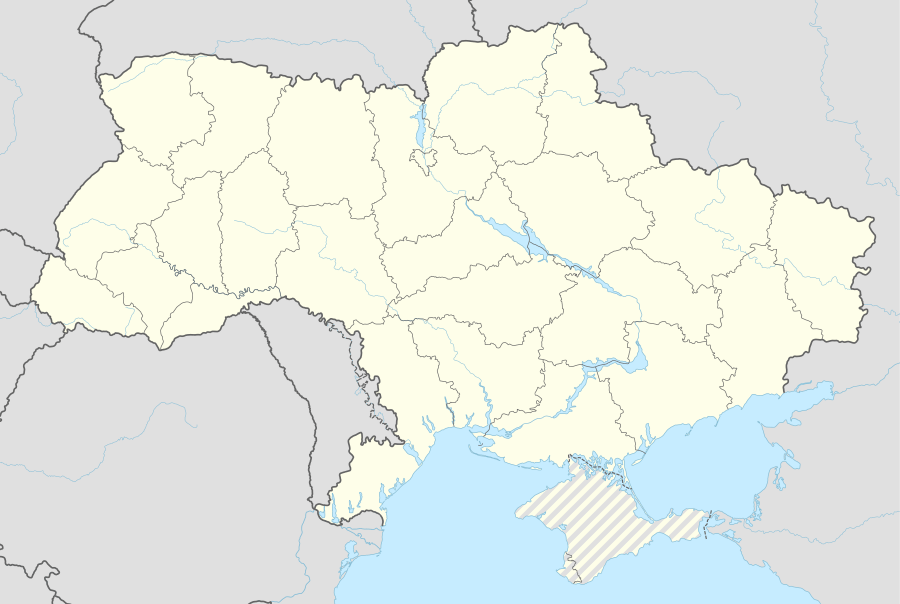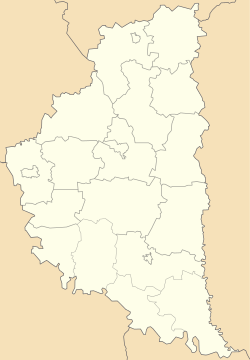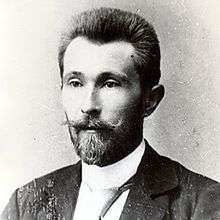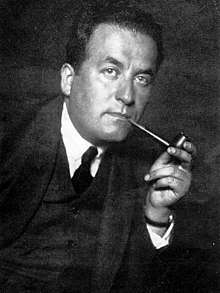Buchach
Buchach (Ukrainian: Бучач; Polish: Buczacz; Yiddish: בעטשאָטש, romanized: Betshotsh or ביטשאטש (Bitshtosh); Hebrew: בוצ'אץ' Buch'ach; Turkish: Bucaş) is a city located on the Strypa River (a tributary of the Dniester) in Ternopil Oblast (province) of Western Ukraine. It is the administrative center of the Buchach Raion, and rests 135 kilometres (84 miles) south-east of Lviv, in the historic region of Halychyna (Galicia). The city was located in Habsburg Monarchy (1772—1804), Austrian empire (1804—1867), Austro-Hungary (1867—1918), West Ukrainian People's Republic (1918—1919), and Poland (1919—1939). The estimated population was around 12,500, according to the 2001 Ukrainian census.
Buchach Бучач Buczacz | |
|---|---|
 Panoramic view of Buchach in 2012 | |
Coat of arms | |
 Buchach Map of Ukraine with Buchach highlighted.  Buchach Buchach (Ternopil Oblast) | |
| Coordinates: 49°05′00″N 25°24′00″E | |
| Country | |
| Oblast | |
| Raion | Buchach Raion |
| First mention | 1260 |
| Magdeburg Rights | ab. 1370 (first), 1515 (second) |
| Government | |
| • City Head | Yosyf Mostsipan |
| Area | |
| • Total | 9.98 km2 (3.85 sq mi) |
| Population | |
| • Total | 12,511 |
| • Density | 1,253.6/km2 (3,247/sq mi) |
| Time zone | UTC+2 (EET) |
| • Summer (DST) | UTC+3 (EEST) |
| Postal code | 48400 — 48401 |
| Area code(s) | +380 3544 |
| Website | http://rada.gov.ua/ |
History
The earliest recorded mention of Buchach is in 1260 by Bartosz Paprocki in his book "Gniazdo Cnoty, zkąd herby Rycerstwa Polskiego swój początek mają", Kraków, 1578.[1] The validity of this date was reasonably refuted by the Polish scientist Józef Apolinary Rolle.[2]
In 1349, the region of Halychyna (Galicia) became part of the Kingdom of Poland. As a part of Ruthenian Voivodeship remained in Poland from 1434 until 1772 (see Partitions of Poland). It was during this time that the area experienced a large influx of Polish, Jewish and Armenian settlers. In the late 14th century, Polish nobleman (szlachta), Michał Awdaniec, Abdank coat of arms became the owner of the town on 1360-s or 1370-s. On July 28, 1379, Michał Awdaniec founded a Roman Catholic parish church, and built a castle. According to at least one accounting, in 1393, King Władysław II Jagiełło agreed to grant Magdeburg rights to Buchach (Buczacz): it was first Magdeburg-style city, located in the Halych Land. In the early 15th century, the Awdaniec family of Buchach changed its last name into Buczacki, after its main residence. Frequent invasions of the Crimean Tatars brought destruction to the town, and in 1515, it once again received the Magdeburg rights. In 1558 Katarzyna Tworowska nee Buczacka get the king's grant for market in Buchach. In 1580, local castle was rebuilt: the castle was twice besieged by the Tatars (1665, 1667), who finally captured it in 1672, during the Polish–Ottoman War (1672–1676). Buchach was a temporary residence of Mehmed IV; here, on October 18, 1672, the Treaty of Buchach was signed between Polish–Lithuanian Commonwealth and the Ottoman Empire. According to this treaty, Poland handed the provinces of Ukraine and Podolia to Turkey.
In the 17th and 18th centuries, Buchach belonged to the Potocki family. Mikołaj Bazyli Potocki, the Starosta of Kaniv, Bohuslav, the son of Stefan Aleksander Potocki, Voivode of Belz, who became a Greek-Catholic about 1758, built here Buchach cityhall with a 35-meter tower (near 1751), a late Baroque Roman Catholic Church of Assumption of Mary (1761–1763), and rebuilt the castle, destroyed by the Turks. With the unification of Poland and Lithuania in 1569, the newly united kingdom extended from the Baltic to the Black Sea. Owing to its importance as a market town, Buchach had become a prominent trading centre linking Poland and the Ottoman Empire.
In 1772, Eastern Galicia[3] together with other areas of south-western Poland, became a part of Kingdom of Galicia and Lodomeria — a crownland of the Habsburg Monarchy as part of the First Partition of Poland. Industry came to Buchach around the end of the 19th century. Among the small-scale industries there included a brickworks, and candle and soap factory, (modern) flour mills, a textile plant, and a necktie factory. The town also boasted a brewery and a winery. The largest factory was established early in the 1900s, when the Hilfesverein concern of Vienna set up a plant for the manufacture of wooden toys in Buchach employing some 200 workers, mainly young girls. In 1912 the Stanislaviv-based Savings and Credit Union opened a branch in Buchach, and this served as a bank for local industrialists and business.
Buchach remained a part of Austria and its successor states until the end of the First World War in 1918. The town was briefly a part of the independent West Ukrainian People's Republic before it was captured by the Republic of Poland in July 1919 after Ukrainian-Polish War.[4] Also, between August 10 and September 15, 1920, it was occupied by the Red Army (see Polish-Soviet War). In the Second Polish Republic, Buchach was the seat of a county (powiat) in Tarnopol Voivodeship. In the 1920s, Buchach was inhabited by Jews (~60%), Poles (~25%), and Ukrainians (~15%). On September 18, 1939, during the Soviet Invasion of Poland, Buchach was occupied by the Red Army, and incorporated into the Ukrainian SSR (see Molotov–Ribbentrop Pact). In 1941, it was invaded by Nazi Germany. Before World War II, approximately 10,000 Jews (half of the local population) lived in Buchach. According to the Soviet Extraordinary Commission, approximately 7,000 Jews were killed in Buchach during the Nazi occupation. Some were sent to Belzec, others murdered in the streets or in killing places in the forests. A few escaped to the Soviet Union or lived in the forests and fields. In May 1943, Buchach was proclaimed Judenfrei town. When Soviets retook the town on July 21, 1944, only about 100 Jewish survivors remained.[5] In 1945, its Polish residents were resettled into the lands of western Poland that had previously been German, and Communist authorities closed the parish church, turning it into a storage facility. Bones of the members of the Potocki family, kept in the church cellar, were thrown out, and later buried at the local cemetery.
In 1965, the neighboring village of Nahirianka was annexed to Buchach. After the fall of the Soviet Union in 1991, Buchach became a part of independent Ukraine, and new, Ukrainian government returned the church to its rightful owners.
Coat of arms
The coat of arms of Buchach originated from the Piława coat of arms, which was used by the Potocki family.
Education
- Saint Josaphat Institute
Religion
The city has religious communities of different churches: Ukrainian Greek Catholic Church, Ukrainian Autocephalous Orthodox Church, Ukrainian Orthodox Church – Kyiv Patriarchate, Adventist Church and others.
Churches
- St. Nicholas (Mykolai) church (n. 1610,[6] Kievan Metropolis, UGCC, Russian Orthodox Church, Ukrainian Autocephalous Orthodox Church, now — Orthodox Church of Ukraine)
- Church of the Intercession (St. Pokrova church) (n. 1763, UGCC)
- Church of the Precious and Life-Giving Cross, or Church of the Elevation of the Cross (1771, UGCC)
- St. Mykhaylo church (Nahirianka, 1910, built by Greek Catholics, from ab. 1990 Ukrainian Autocephalous Orthodox Church, now — Orthodox Church of Ukraine)
- St. Volodymyr church (Ukrainian Orthodox Church – Kyiv Patriarchate, now — Orthodox Church of Ukraine)
- Procathedral church of Annunciation to the Blessed Virgin Mary (2007—2014, UGCC)
- Church of Assumption of Mary (1761—1763, Roman Catholic church)
People from Buchach
Born in Buchach
Ukrainians
- Mykola Bevz, scientist, member of ICOMOS[7]
- Yaroslav Padokh, scientist,[8] President of Shevchenko Scientific Society in USA and President of Shevchenko Scientific Society's the World Council in 1982–1992
- Ihor Pylatiuk, scientist, musician, the rector and professor of the violin department of Lviv National Musical Academy named after Mykola Lysenko[9]
- Bohdan Botsiurkiv, Ukrainian-Canadian scientist[10]
- Nataliya Katser-Buchkovska, a member of the "People's Front" political party and is part of the Ukrainian Parliament (8th convocation of the Ukrainian Verkhovna Rada).
Poles
- Leopold Pamula, Polish Air Force pilot, who fought in the Invasion of Poland
- Jan Franciszek Adamski, Polish film actor and writer
- Władysław Zych, Polish scientist, geologist and soldier of the Home Army
Jews
- Shmuel Yosef Agnon (1888–1970), Nobel Prize-winning author
- Simon Wiesenthal, an Austrian writer and Nazi hunter
- Emanuel Ringelblum, historian, politician and social worker
- Joachim Flescher, M.D., (1906–1976) psychiatrist-psychoanalyst
- Mina Rosner, a Canadian writer
- Ruben Feldschuh (Ben Shem) (1900–1980), Zionist author and political activist[11]
- Max Nomad (1881–1973) is the pseudonym of Austrian author and educator Max(imilian) Nacht.[12]
People associated with Buchach
Ukrainians
- Volodymyr Hnatiuk (1871–1926) — writer, literary scholar, translator and journalist, and was one of the most influential and notable Ukrainian ethnographers [13]
- Bohdan A. Futey, judge of the United States Court of Federal Claims from 1987 to 2002
Poles
- Dawid Buczacki, voivode of Podole in the late 15th century
- Jakub Buczacki, royal secretary and Bishop of Płock in the first half of the 16th century
- Michał Buczacki, Polish nobleman, the voivode of Podole, and the Castellan of Halicz in 1433–37
- Stefan Potocki, voivode of Bratslav, starost of Fellin
- Stefan Aleksander Potocki, with wife Joanna founder of Buchach monastery UGCC
- Mikołaj Bazyli Potocki, starost of Bohuslav, Kaniv, benefactor of the Buchach's townhall, churches, Pochayiv Lavra
- Jan Tworowski, voivode of Podole, owner of Buchach
- Antoni Opolski, physicist, rector of Opole University
Jews
- Abraham David ben Asher Anshel Buczacz, Rabbi of Buchach
- Alicia Appleman-Jurman, Holocaust survivor and author
Unknown nationality
- Johann Georg Pinsel, Baroque sculptor, named Halych's Michelangelo
- Bernard Meretyn, an architect of the late Baroque and rococo (possibly of German origin)
Communications
The closest international airports are:
- Lviv International Airport, in Lviv (LWO), ca. 190 km (118 mi) away
- Ivano-Frankivsk International Airport, in Ivano-Frankivsk (IFO), ca. 50 km (31 mi) away
- Chernivtsi International Airport, in Chernivtsi (CWC), ca. 70 km (43 mi) away
- Rzeszów International Airport, in Rzeszów (RZE), Poland, ca. 220 km (137 mi) away
International relations
Twin towns and sister cities
Buchach is currently twinned with:


References
- Bartosz Paprocki, Gniazdo Cnoty, zkąd herby Rycerstwa Polskiego swój początek mają... Kraków: drukarnia Andrzeia Piotrkowczyka 1578, s. 609. pol.
- Dr. Antoni J.: Zameczki podolskie na kresach multańskich. T. I : Kamieniec nad Smotryczem. Warszawa: nakładem Gebethnera i Wolffa, 1880, s. 10. pol.
- Due to polish authors, Red Ruthenia.
- Andrzej Chojnowski, Ukrainian-Polish War in Galicia, 1918–19 in the Internet Encyclopedia of Ukraine, vol. 5 (1993)
- "Execution Sites of Jewish Victims Investigated by Yahad-In Unum". Yahad-In Unum Interactive Map.
- Buchach: Saint Nicholas's Church (1610).
- MYKOLA BEVZ
- Chubaty, Mykola in the Internet Encyclopedia of Ukraine
- Academical Chamber Orchestra HARMONIA NOBILE
- Bociurkiw, Bohdan in Encyclopedia of Ukraine, 2015
- Laurence Weinbaum, "Shaking the Dust Off" The Story of the Warsaw Ghetto's Forgotten Chronicler, Jewish Political Studies Review Vol. 22 No. 3–4 (Fall 2010).
- Max Nacht Papers at International Institute of Social History
- Mykola Mushynka, Hnatiuk, Volodymyr in Encyclopedia of Ukraine, vol. 2 (1989).
- Uchwała Nr LIII/372/2010 w sprawie współpracy partnerskiej ze społecznością lokalną miast, Buczacz pl
Further reading
- Omer Bartov, Anatomy of a Genocide: The Life and Death of a Town Called Buczacz, Simon & Schuster, 2018
External links
| Wikimedia Commons has media related to Buchach. |
- Buchach in the Encyclopedia of Ukraine, vol. 1 (1984).
- Verkhovna Rada website — city of Buchach, Buchatskyi Raion, Ternopil Oblast
- Buchach Today
- Buchach info site with photos and history
- The murder of the Jews of Buchach during World War II, at Yad Vashem website.
- Buchach Jewish Cemetery fully documented at Jewish Galicia and Buckovina ORG
Sources
- (in Polish and Latin) Sadok Barącz, Pamiątki buczackie.— Lwów: Drukarnia «Gazety narodowej», 1882.— 168 s.

